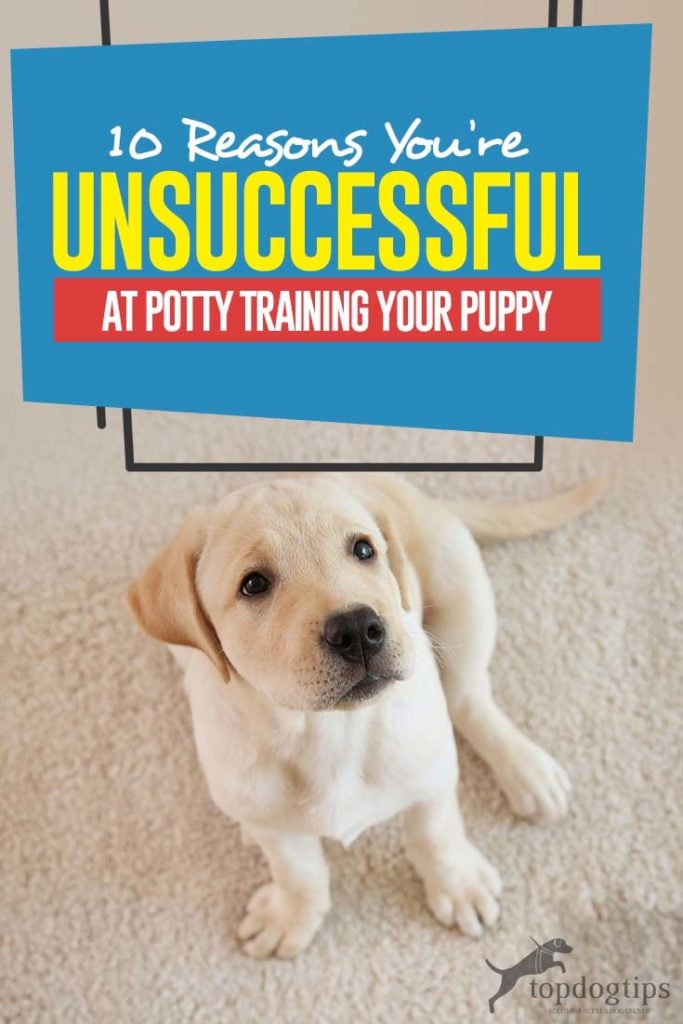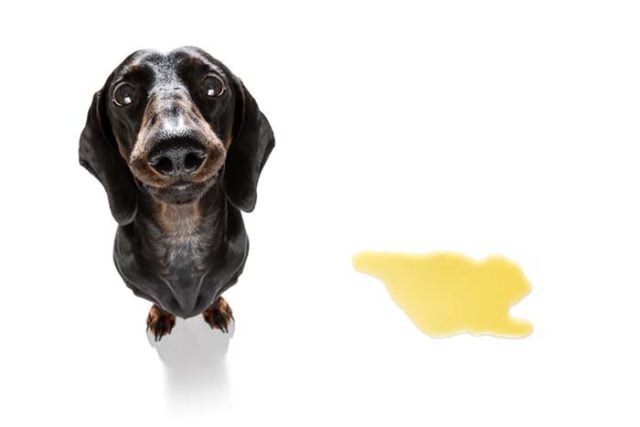
Table of Contents
You've recently adopted a dog, and it's time for housebreaking.
Potty training even the smartest of pooches, can be frustrating sometimes. And then, even after you've read all the tips and talked to your friends, you find yourself not being able to communicate with your puppy properly and effectively.
So what are the reasons you're unsuccessful at potty training puppies time after time? Here are some possible answers.
Why Your Potty Training Session With Your Puppy is Unsuccessful
1. Mismanaging the Dog's Environment
As the leader in this situation, it's your job to manage your dog's environment, including a consistent and safe place for relief and a coherent, steady routine.
Dogs are creatures of habit just like us, so instilling good habits through dependable repetition with exacting supervision is essential.
Factors that go into picking a good, consistent spot where you want your puppy to go include avoiding distractions, success-bolstering scents, and quick accessibility.
If you take your puppy outside where there are toys, other animals, or many people, they'll lose track of the objective easily. Control those factors as best you can.
Scent wise, use those indoor accidents to your favor. Clean them up and carry them outside to the designated area, leaving them there. That spot now smells familiar to your puppy and encourages success.
Then there's location. You need to be able to reach that spot easily on your scheduled “out” times or when you notice signs of your puppy needing relief. If you're five stories up, build that awareness into your potty training routine and overall response to your pup.
2. Lack of Leadership
You two are best friends, but you are also viewed as the leader of the pack your dog belongs to.
Like with all other training, let your pup know who is the boss and be definitive and confident about where you want him to relieve himself; do not show uncertainty.
Praise the pup for success, but do not scold for failure. Just like children, dogs can start responding to negative attention in ways you don't want (like peeing behind your back).
Being the leader of your proverbial puppy pack does not mean bullying your puppy. From that first day at home, you are the one helping her navigate the human world.
Be firm, consistent, and loving. But at the same time, if your dog trains you – all bets are off.
3. Long Absences
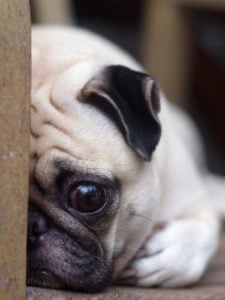 Particularly in very young puppies, long owner absence leads to potty training mistakes and often bad behavior. For dog owners who work long hours, crate training may help alleviate this. This is your dog's cave, which helps develop the “den” mentality. Dogs do not like urinating or defecating in that space.
Particularly in very young puppies, long owner absence leads to potty training mistakes and often bad behavior. For dog owners who work long hours, crate training may help alleviate this. This is your dog's cave, which helps develop the “den” mentality. Dogs do not like urinating or defecating in that space.
Just be aware that your young animal friend cannot stay in a crate for 8 hours straight.
A trip home during lunch may resolve the stress that would be created by elongated crate time, as well as associated accidents. Additional ways to communicate, such as through pet cameras, can also be helpful to your pooch.
4. Lack of (Consistent) Schedule
Schedule is extremely important to dog training and dog care. Puppies, in particular, exhibit faster potty training when you have a set routine for food, play, walks, and bedtime.
Remember that most puppies go first thing when they wake up, about 30 minutes after eating, during exercise, after a nap, and just before bedtime.
Do your best to accommodate this while also remaining aware of other signals during in-between times.
5. Missing the Signs
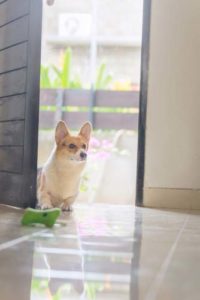 Speaking of signals, it's easy to miss the signs that your puppy needs out when you wouldn't normally be walking them. The dog may stand by a door instead of barking or scratching, or start walking in a circle. Keep your leash at the ready and remember to keep your eyes peeled for those, particularly during the weeks/months of potty training.
Speaking of signals, it's easy to miss the signs that your puppy needs out when you wouldn't normally be walking them. The dog may stand by a door instead of barking or scratching, or start walking in a circle. Keep your leash at the ready and remember to keep your eyes peeled for those, particularly during the weeks/months of potty training.
Other tell-tale signs include pacing, whining, hiding and sniffing about. Most young dogs have a consistent tell or two, making it easier to recognize over time. Watch for those.
Expert tip: If you find your puppy doesn't bark to go out, use a doggy doorbell or simply try finding a noisy toy to hang from your door. Make it into a game.
Every time you take the pup to the door tap the toy. Show him how to do so. Now you have a “door bell” that people (other than you) can hear for speedy response.
6. Unreasonable Expectations
Every dog is different. Some have small bladders. Some seem to need to go out earlier than you expect, and some sleep through the night sooner than other breeds.
Every dog is different, and it's up to us to recognize those patterns in our pups and consider them during potty training.
Until 16 weeks of age, dogs really don't have full bowel or bladder control. You need to respond to your dog's physical schedule and adjust your potty training accordingly.
Patience and practice make perfect, but a new dog means investing time and energy. Don't cut corners in the process.
7. Free Feeding
Free feeding can be an okay technique with some adult dogs, but it's unlikely to be a good idea with puppies. So, pick up any leftover food once your puppy finishes.
Keep your young dog to a strict feeding schedule, once in the morning and once at night. Don't give them snacks other than occasional small treats, particularly for doing well at training.
Food and water intake both affect the times at which a dog needs to go out and disrupts your well-planned schedule quite a bit if you're not careful.
8. Unintentional Punishment or Scarce Rewards
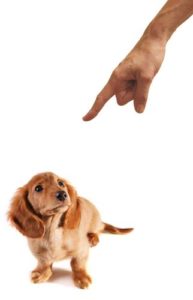 While mistakes are frustrating, yelling at your puppy fixes absolutely nothing. Instead, what some dog trainers suggest is that when you catch the pup in the act, make a simple noise like a single clap with your hands. That distracts your dog and sometimes even stops things before completion. Now, you can move the puppy to the designated location.
While mistakes are frustrating, yelling at your puppy fixes absolutely nothing. Instead, what some dog trainers suggest is that when you catch the pup in the act, make a simple noise like a single clap with your hands. That distracts your dog and sometimes even stops things before completion. Now, you can move the puppy to the designated location.
When your puppy gets it right, always praise them and give them a special treat as soon as possible. Yes, that means petting your puppy, saying things like “good out” loudly and excitedly followed by something yummy.
By the way, a little play time after that reward is also a huge bonus and reinforcement for your puppy. He will learn to do his business first and play second.
9. Household Products
Some household products and cleaners (unless they're pet urine cleaners) are ammonia based. And while you might reach for that out of habit, to your puppy it smells similar to urine, and he's likely to pee again in a spot where he smells the urine.
That means your diligent clean up efforts lead your dog right back to that spot over and over again. Look for a stain and odor product with enzymatic properties instead, like those specifically for dogs/pets.
10. Health Issues
Not all puppy potty training disasters are caused by your failures or the failures of your dogs.
Sometimes, there are health factors involved. These include dietary problems, allergies, urinary tract problems, a variety of infections, and genetic disorders that may lead puppies to accidents.
If you feel this is possible, consult with your veterinarian and a canine behaviorist if necessary as soon as possible for an examination and taking the next possible steps.
READ NEXT: New Puppy Checklist – 15 Things You Must Do


